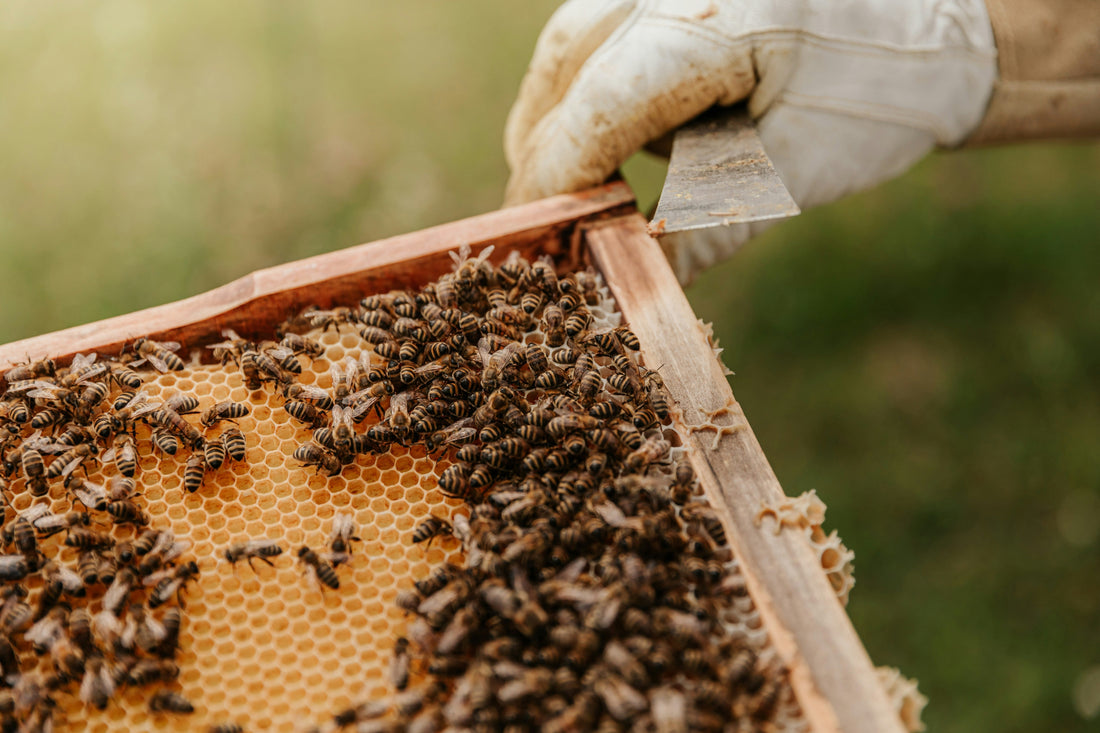You are probably wondering what neonicotinoids are. It's a word to learn BY HEART, friends! Yes, yes, it's super classy in a conversation over a glass of wine and in addition it earns 18 points in Scrabble. Imagine if you position it on the three "triple count word" boxes, 1782 points all at once! Don't thank me, I'm happy! That said, I challenge you to make it happen.
In the meantime, France has 57.5 billion bees (sorry for the api-phobics) and some 1.5 billion hives which are all key witnesses to the quality of agricultural practices and their consequences on the natural and living environment.
Although in our eyes all bees are the same, there are a very large number of species of bees, wild or domestic. Too often confused with hornets, wasps and bumblebees, the bee is a small hairy, vegetarian insect (the bee is too trendy!) which stings only to defend itself and dies following the loss of its stinger. Nowadays, we know bees above all for their production of honey and their formidable sting, but much less for their role as pollinators. Yes good, and then will you tell me? 80% of the staple foods in the human diet depend on pollination, a process essential for the sexual reproduction of flowering plants. Of course, the bee is not the only pollinator that exists. However, as the adage attributed to Albert Einstein says, “If the bee disappeared from the surface of the globe, man would only have four years to live. ". You will have understood it, if Albert said it, it is because it plays an important role in the food cycle, and I do not even speak to you about the benefits on our health of the products resulting from its universe like pollen nectar, royal jelly, etc.
In short, more than 80 million years that bees forage happily and can therefore be called very resistant and easily adaptable insects. However, for a little over ten years, beekeepers and the scientific community have been able to observe a massive mortality phenomenon on a global scale in bees, the causes of which are multiple: parasites, electromagnetic fields, GMOs, hornet Asia, climate change, erosion of natural areas, agricultural practices, pesticides. The disappearance of bees constitutes a considerable challenge for the future of biodiversity, this vast and rapid phenomenon that man does not control, and what interests us today is what is being done to preserve it in France.
So what is France doing?
Neonicotinoids, this barbaric word which is probably unfamiliar to you, is the number one enemy of bees. It is a category of new generation pesticides launched in 1993 which coats the seed to pass through the cell walls and therefore directly into the sap of the plant. Thus, when a parasite attacks, the plant has the capacity to defend itself since it benefits from the chemical product internally. Spread by spraying, neonicotinoids do not target any insects. When the bee forages, the pesticide passes into the nectar through the pollen and then ends up in the hive. And here is the drama. The bee mortality rate climbs from 5% to 30%. As with GMOs, which are banned in France, it is important that political representatives commit to removing certain products from agricultural practices to improve the overall system. Since 2016, thanks to the Biodiversity Law which marks the end of neonicotinoids, bees will be able to forage in peace. Finally, from September 2018, when it will be effective.
In short, bees constitute an environmental indicator and can be used as the mirror of culture: the treatment afflicted to bees with pesticides can be directly highlighted with the treatment that man afflicts himself so much from a view of health than cultural. I'll let you think about it with a small glass of red wine by the fire.
At Oé, we are already aware of all the positive impacts of a world without pesticides, for us, for the biodiversity of our environment and for the bees. It's your turn to promote biodiversity with a few simple everyday gestures!
Some best practices:
For individuals
- Raising awareness and informing about the protection of bees
- Change gardening methods by diversifying gardens and encouraging the reduction of pesticide use
For city businesses:
- Install beehives on the roofs
For decision makers:
- Promote the planting of pollen shrubs (great!)
- Sowing floral fallows
- Prioritize gardens in urban areas
- Encourage beekeepers to better manage their livestock to avoid concentrations of hives
- In the name of the precautionary principle, ban dangerous insecticides and set up a monitoring system
- Limit the cultivation of GMOs
In summary: The decline of bees explained in 3 min.





